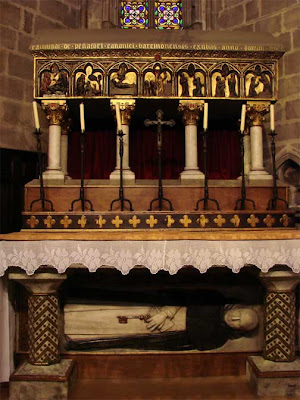
One of yesterday’s entries in the Cistercian Menology is a good parable on the dangers of making assumptions:
At Citeaux, Blessed Alanus, Lay Brother. An amusing legend reveals to us what impression the knowledge and humility of our Blessed left. “You are the devil or you are Alanus—I am not the devil: I am Alanus.” The words were addressed to him in a plenary Coucil by a heretic, whose every argument was refuted by a little Lay Brother emerging as if miraculously from the aegis of his Abbot. This Brother was in reality Master Alanus, surnamed the Universal Doctor. And who as the result of a divine revelation [had] left the chair which he held at Paris with so much applause, in order to take the humble habit of a Lay Brother at Citeaux. He was appointed to tend the sheep. When he was recognized at the Council, he was offered important dignities; but he refused them and remained in his modest employment. He lived to a very advanced age, 116 years according to some writers. Then, in the year 1294, he went to contemplate in Heaven the eternal Truth. When the definition of the Immaculate Conception was being discussed, a notable passage of his Elucidation of the Canticles, secured for the Bessed Alanus the honor of being cited as a witness thereunto of the belief of the 12th Century.
Alain de Lille, also known as Alain ab Insulis and Alain de l’Isle, was born in or before 1128 and most likely died in 1202 or 1203. The breadth of his learning earned him the titles of Alain the Great and Universal Doctor. Many of the details of his life are hard to piece together because his career is easily confused with a number of literary Medieval Alains. The anecdote about his being either Master Alain or the devil probably stems from his participation in the Third Lateran Council in 1179 at the height of Cistercian influence in the Church. The Catholic Encyclopedia speaks of his theology as, “characterized by that peculiar variety of rationalism tinged with mysticism which is found in the writings of John Scotus Erigena, and which afterwards reappeared in the works of Raymond Lully.” While many of his contemporaries looked primarily to Aristotle, Alain found greater inspiration in Plato and Pythagoras. He was a noted poet and Latinist who influenced Dante and is quoted by Chaucer.
We are often presented with an image of the lay brother as the fount of earthy good sense undiluted by too much formal learning and the choir monk as the bookish literary type who might not have much common sense. The life of Alain de Lille leaving Paris to tend sheep, at least as recorded in the Menology, reminds us that calling often transcends the dictates of temperament. For all his knowledge, which he used to good effect, he says in the hymn below that our salvation lies in simple faith and the love of God and man.
In his highest glow and glory
Man's estate is transitory;
Speeds the hour and comes decay;
Dead the flower, the bloom is blighted,
Day is done, and man, benighted,
Falls and changes into clay.
Life is all a road of danger,
Man, therein, a passing stranger
Hastening onward to the grave;
Like the grass upon the meadow,
Like the day that dies in shadow,
Or the stream in ocean's wave.
Death is with us at the starting
Of our journey; at the parting
We behold his sullen face;
Still we bow beneath his burden;
Grief and labor are the guerdon
He awards us in the race.
See thy state, O Man, and wonder!
Learn the law thou livest under;
But be also swift to scan
These great ends of thy creation,
Simple faith, thy own salvation,
And the love of God and man.
A portion of a hymn by Alain de Lille
Translated by Daniel Joseph Donahue
HT to The Lion and the Cardinal
Image: Les Paraboles Maîstre Alain, 1492.










